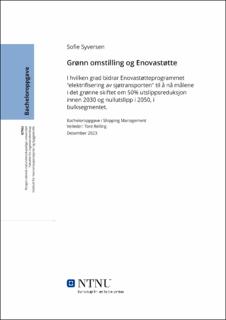| dc.contributor.advisor | Relling, Tore | |
| dc.contributor.author | Syversen, Sofie | |
| dc.date.accessioned | 2024-02-16T18:19:47Z | |
| dc.date.available | 2024-02-16T18:19:47Z | |
| dc.date.issued | 2023 | |
| dc.identifier | no.ntnu:inspera:155609108:192574982 | |
| dc.identifier.uri | https://hdl.handle.net/11250/3118233 | |
| dc.description.abstract | Denne oppgaven ser på Enovastøttens innvirkning på grønn omstilling i bulksegmentet, med fokus på prosjekter som har fått støtte gjennom programmet «elektrifisering av sjøtransporten». Med store mål om utslippsreduksjon og 0-utslipp må det skje drastiske endringer i skipsfarten slik vi kjenner den. Ny teknologi og batterihybridisering er noen tiltak som etter planen skal gjøre det mulig å nå disse målene. Grønn omstilling er derimot dyrt, og støtteordninger som Enova er viktige for å kunne gjøre grønn omstilling.
Gjennom en kvalitativ analyse med intervju som innsamlingsverktøy belyser denne oppgaven rederienes tanker rundt støtteordningen og målene om 50% reduksjon innen 2030 og 0- utslipp innen 2050. Funnene viser at endringsviljen er høy og at holdningene til det grønne skiftet er positive. Enovastøtteprogrammet er med på å klargjøre bransjen til det store teknologihoppet og holder de mindre rederiene nysgjerrige og villige til å gjøre endringer. | |
| dc.description.abstract | This thesis examines the impact of Enovas allocation on green transformation in the bulk shipping segment, with a focus on projects funded through the "electrification of maritime transport" program. With ambitious goals for emission reduction and zero emissions, drastic changes in shipping as we know it are necessary. New technology and battery hybridization are some measures planned to achieve these goals. However, green transformation is costly, and support programs like Enova are crucial to facilitate this shift.
Through a qualitative analysis using interviews as a data collection tool, this thesis sheds light on shipowners' perspectives regarding the allocation program and the goals of a 50% reduction by 2030 and zero emissions by 2050. The findings indicate a high willingness for change and positive attitudes toward the green shift. The Enova allocation program plays a role in preparing the industry for a significant technological leap, keeping smaller shipping companies curious and willing to make changes. | |
| dc.language | nob | |
| dc.publisher | NTNU | |
| dc.title | Grønn omstilling og Enovastøtte | |
| dc.type | Bachelor thesis | |
